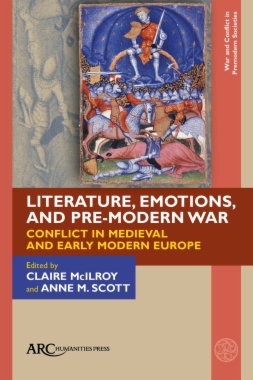This collection assembles work by some of the foremost English-speaking scholars of pre-modern thought and culture and is the fruit of the Australian Research Council's ground-breaking Centre of Excellence for the History of Emotion. The impact of war, a human activity that is both public and politically charged, is examined as it affects private human lives caught up in public and political situations. The essays, many of them influenced by the burgeoning field of study in the history of emotions, examine the often unconsidered effects of war—on the individual and on the commune—as revealed in the study of well-known texts such as Beowulf, Piers Plowman, Malory’s Le Morte Darthur, and Chaucer’s Troilus and Criseyde, as well as other lesser-known works that mirror the concerns of the society in which they were conceived. These latter range from the twelfth-century chansons of the Crusades, through the fifteenth-century French and English political works of Alain Chartier, to the twentieth-century anti-war satirical films of Mario Monicelli.
- Front Cover
- Front matter
- Half Title
- Editorial Board
- Title Page
- Copyright Page
- Table of Contents
- Abbreviations
- Preface
- Body matter
- Introduction: The Long Reach of War
- The Emotional Coasts of War
- Voicing Conflict
- The Impact of War
- Conclusion
- Chapter 1: Love in Times of War: Some Shakespearean Reflections
- In Which We Serve
- The War Widow
- The Best Years of Our Lives
- The War Bride
- Dad's Army
- Brief Encounters
- Part One: The Emotional Costs of War
- Chapter 2: "She Shal Bryngen us the Pees on Every Syde": The Ceremonial Restoration of Women in Late Medieval Culture
- Criseyde
- Isabelle
- Guenevere
- Conclusion
- Chapter 3: Emotions and War in Chaucer's Knight's Tale
- Physical "Roaming" and Emotional Turmoil in Chaucer and Boccaccio
- Emelye's Movement
- Chapter 4: Making Dole in Malory
- Grief and Anger on the Field: The Chastelayne
- Tomb Narration: Launceor & Columbe and Balyn & Balan
- A Great Death: Sir Gawayne
- Part Two: Voiceing Conlfict
- Chapter 5: The Hero "Remembers": The Verb Gemunan in Beowulf and the Battle of Maldon
- Chapter 6: The Hard Parting: Conflicting Codes of Fin'Amors and Christian Duty in the Old French Chansons De Croisade
- How Songs Work: I
- How Songs Work: II
- Tentative Conclusions
- Chapter 7: Christ Versus Lucifer in Piers Plowman
- Imagery in Piers Plowman
- The Incarnation
- The Humanity of the Second Person of the Trinity
- Conclusion
- Chapter 8: Breathing in Peace and War: Malory's Le Morte Darthur
- The Virture of Life
- The Breath of War
- Play and Passion
- Battles of the Spirit
- The Heaviest Tidings
- Chapter 9: Giving and Gaining Voice in Civil War: Alain Chartier's Quadrilogue Invectif in Fifteenth-Century England
- Part Three: The Impact of War
- Chapter 10: Oriental Despotism and the Reception of Romance
- Chapter 11: Belon, Palissy, Ronsard, and the War for the Forests of France
- Pierre Belon: Productivity and the Call for Forest Exploitation
- Bernard Palissy: Sustainability As the Spiritualization of Forest Exploitation
- Pirre de Ronsard: From Sylvan Destruction to Salvation
- Conclusions
- Chapter 12: Holy War, Cold War: War, Comedy, and the Lessons of History in the Films of Mario Monicelli
- End matter

